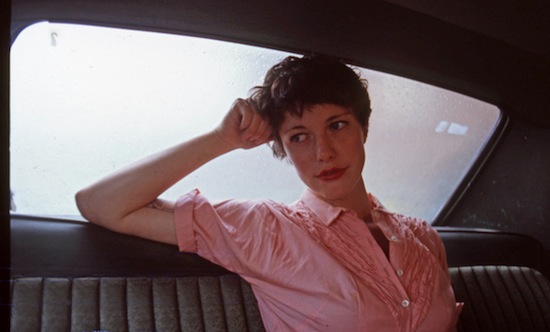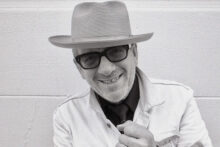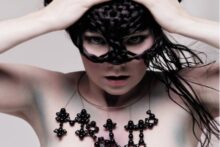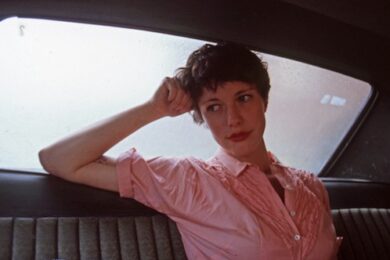Singer-songwriter Esmé Patterson, formerly of Denver, Colorado Americana band Paper Bird and now based in Portland, Oregon, sat down one night in a hotel room to learn how to play Townes Van Zandt’s ‘Loretta’. Pissed off at the lyrics she was reading carefully for the first time (“Long and lazy blonde and free/And I can have her any time”), she gave up on Van Zandt’s song and instead wrote ‘Tumbleweed’, in which Loretta, speaking for herself, advises her sometime lover not to be so presumptuous and tells him, “I’ll keep my dancing shoes on/ Long after you’ve gone.”
The song became a jumping-off point for the album Woman To Woman, released in the UK this week. Each song is prompted by a song written from a man’s point of view, whose title is a woman’s name. The resulting album ranges from the sparky, skippy, alt-country of ‘Tumbleweed’, or ‘Valentine’, a finger-flickingly devastating riposte to Elvis Costello’s song ‘Alison’ (“I’ll take off a dress or I’ll put on a dress whenever I choose”) and “What Do You Call A Woman”, a stompingly, howlingly angry (live, Patterson can scream) reimagining of the feelings of Michael Jackson’s Billie Jean, through to ‘Bluebird”s invigorating portrait of a contented Eleanor Rigby, ‘Wildflower”s dawn-delicate fingerpicked letter from Bob Dylan’s Ramona or the lilting lightness of The Kinks’ Lola inviting you on to the floor in ‘Oh Let’s Dance’.
Patterson took time out from fielding the song suggestions still flying in from family, friends and internet commenters to talk some more about the ideas behind the record.
A lot of the tracks are about someone who’s been wronged getting her right to reply. But something like ‘Wildflower’, your response to ‘To Ramona’, is more nuanced.
Esmé Patterson: Yeah, I didn’t want it to be too one-sided. In ‘To Ramona’, he’s actually really sweet. Which for Bob Dylan… that’s not a coat he wears very often, towards women especially. And I thought it was important to do a response that was a wistful look at an old love. And then the ‘Alison’ response is a bitter, angry look at an old love. I wanted to make sure it was well rounded, that there were all sorts of responses. I appreciate you pointing that out, because a lot of people have perceived it in one dimension, like, “These are angry girl songs”. There certainly are those…
There certainly needs to be…
EP: Exactly. But I think that the full spectrum should exist, also. It’s not a vengeful, angry record. The goal is to create human dimensions to these fictional characters. And humans feel all sorts of feelings. Anger is one of them, and it’s not the only one. I didn’t do ‘Billie Jean’ in the first batch, because I thought that my response would be too easy. And I chose to do that one because most people don’t know what that song’s about. Most people haven’t closely listened to the lyrics. Myself included, before I did this project. That was an easy response, because that’s a clear moral, of what a woman would feel in that situation. There were no grey areas. But the part that was interesting to me was the contrast between the way ‘Billie Jean’ sounds and what it means. It’s a dance song, it comes on at a party and everybody’s dancing to it, and then what it’s actually saying… it’s this cowardly, cruel sentiment. I was just like, “Woah! Fuck you!”
Was that the one that made you angriest? You look furious even now.
EP: Well, it sucks! If you just came out and said the core of the song in a sentence, people would be like, “Oh, you’re an asshole!” But if you get production, and you get a good beat behind it and a slick melody, people are like, “Oh, I love this song!” and never think what it’s about. And it’s subconsciously affecting us. I think people don’t really listen to lyrics. Some people do, and bless them, but they’re rare. I feel like the process of this album really taught me to listen.
It was great that you included ‘Oh Let’s Dance’, your reply to The Kinks’ ‘Lola’. There’s so much discussion about trans women at the moment, often quite backward, so it feels really great to have that addressed in such a sparkling song.
EP: I think it’s the civil rights movement of our generation, for trans people and for homosexual people and for all the spectrum of humans that are human beings and should be treated like fucking human beings. It seemed that it was important to me to put that response in there too. It takes such a brave person, to stand fully in who they are and unapologetically fly their flag. I admire the courage of trans people so much. I have good friends, and I just think they’re really misunderstood and oppressed and laughed at. In that song! In Lola! I love The Kinks, they’re one of my favourite bands, but they’re laughing at her! And they’re laughing at their friend, who has ‘accidentally fallen for a man’. But this isn’t a joke to her! She’s not laughing! She’s just living her life and trying to love who she finds attractive. And it was important to me to put that in a frame that was unapologetic and flirty and all on the table. That’s another discussion that I think should be opened up in an honest, considerate way.
A friend told me, when I was talking about your record, about the Hurray For The Riff Raff song ‘The Body Electric’ – a rejection of the use of women as murder ballad victims. Do we stop listening to murder ballads, or songs that are deeply sexist? Because that’s a lot of songs.
EP: That’s the main point, as well – that’s most songs. And do you not listen to music by people that were abusive to women? Like James Brown, famously. No, I love James Brown’s music. I love John Lennon’s music. It sucks that they were violent men with mommy issues. And that’s a huge philosophical question – do you judge the art by the artist? Does a work stand on its own, out of context? That’s not a battle I feel like I decided to pick and, like I was saying, most of this record isn’t angry stuff. It’s just about opening a discussion. There are some pretty open-and-shut cases that seem clear in their injustice or unbalanced nature. But I think it’s just important that we talk about these things.
Woman To Woman is one way of approaching that problem, too, by just putting the other voice in there.
EP: Right, and it’s like literature – should we ban literature that has violent or questionable or racist views? It’s important to have more information and be able to inform our lives and inform our children and inform our society and weigh against all of these things. But to start shutting things down and not listening to certain songs because of certain reasons, or not reading certain books or seeing certain movies… Who decides what is or isn’t appropriate? And where does that end? I think what we need to do is just open an intelligent conversation about what’s offensive in these works and why and what that means, and how can we learn from those mistakes.
Yes, and as you say it’s something that’s very much not just limited to music. Carol Ann Duffy’s The World’s Wife does a similar thing to your album.
EP: No, it’s totally not only in music. Only recently – in human history – are women even having the education and tools to be able to express themselves to as wide an audience [as men]. In the last hundred, 200 years. There’s millennia of experience undocumented, unexpressed.
The songs you respond to are all older songs. Is it a problem you see less in newer songs, or are the choices more dictated by your taste?
EP: I don’t listen to much new music, but I listen to the radio sometimes and I feel like all the same issues that there ever were are probably still all exactly the same. And this project actually brought that to my attention a lot. How far we have to go, how much work we have to do towards equality between men and women. A lot of people were really fixated on the fact that I’m a woman writing about the experiences of these fictional women. The word ‘feminism’ and the word ‘feminist’ are terrifying words that scare the shit out of people, and either they wanna fix that idea on you and pigeonhole you as a one-dimensional thing – she’s an angry feminist! – or they wanna ignore that aspect of it completely, and say, “Oh, the songs sound nice!” People are so afraid of talking about gender issues.
I read you said that, like Björk, people have questioned whether you really wrote your songs.
EP: Yeah! It’s amazing. I feel like I wanna be careful talking about this because it’s such a difficult issue. It’s complicated, writing songs with another person. But I co-wrote a song with Shakey Graves, and no one ever thinks that I co-wrote the song. Everyone assumes that he wrote it, and I see things on Twitter like, “I wonder what he was thinking when he wrote the song…” They assume I’m just some chick who happened to be standing there in a dress. “Oh, get her in the shot,” you know. It’s amazing to me… No one would question that a man wrote the song if he was singing it. It’s frustrating. But I think Björk said everything that should be said really perfectly.
In a way, rather than your project being shaped by these older, male songs, wouldn’t it be better just to create your own characters?
EP: It seems like it was more poignant to me to draw a contrast to the way these characters were first imagined. The purpose of the work was to turn that object and look at it from another perspective, taking it off the mantelpiece and throwing it on the floor! And then some people get very angry and look at me and put it back up on the mantel, saying, “How dare you!”
Whose fans have been the most offended?
EP: Elvis Costello’s. “Who is she to even say anything?” I’m nobody, but everyone who listens to a song is just a person listening to a song. I think art shouldn’t be held as so sacred that we can’t discuss it, or we can’t reimagine it. Art is the property of culture. It’s our right to examine and criticise. I welcome criticism of my work, and I think it would be really boring if everyone just laid down on the floor and worshipped it without thinking about it. I think it’s even interesting to hear criticisms of my criticisms. Yeah, let’s talk about it! That’s the whole point.
How would you feel if someone made an answer album of male responses to songs narrated by women?
EP: That’d be cool. My friend Will, who played the drums on the album, was joking when I was writing these songs that he would do answer songs to country songs by women. And then he called me halfway through, and he was like: “They’re always right, you can’t argue with them! There’s really nothing to say, they’ve got a good point.” Which, of course, I liked a lot.
Woman To Woman is out on Xtra Mile Recordings







